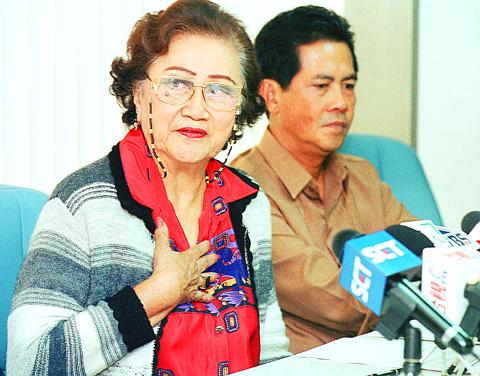After three days, the Taipei-Manila Joint Economic Conference ended yesterday on an upscale note with Taiwan and the Philippines finally signing a memorandum of understanding on the direct hiring of laborers.
But the negotiations became snagged on the second day of the meeting when it was reported that the signing of the new labor accord was to be delayed because Manila was opposed to Taiwan using its official name, the Republic of China.
During the last 10 minutes of the closing session yesterday, however, the top labor officials for both sides -- Bienvenido E. Laguesma, Secretary of the Department of Labor and Employment of the Philippines, and Chan Hou-sheng (

PHOTO: CHIANG YING-YING, TAIPEI TIMES
Both sides, in fact, were reluctant to mention the reason for the change in stance, adding that the document was yet to be released to the public.
According to a Labor Affairs Council statement, the direct hiring project has been proposed for the past five years and the Philippines had agreed to the signing in May 1998. Taiwan's Executive Yuan approved the draft last August, with Taiwan's full name on it.
Lin Tsong-ming (
"It has opened another channel for employers to hire Filipino workers," Lin said. He said employers could apply for permission to hire from the CLA, and the council would inform the Manila Economic and Cultural Office to recruit employees directly.
Lin added that as agency fees would be decreased through direct hiring, the rate of desertion and overstaying by Filipino workers would be reduced, thus improving the management of foreign workers.
"Besides, this project could help employment agencies improve their services in order to gain support from employers. It will be beneficial for all three sides," he said.
As one of the delegates during the negotiation process, Lin said he proposed a so-called "charge" system to be used in recruiting laborers from the Philippines. In such a system, local and foreign agents would charge NT$30,000 and NT$26,000 respectively -- whereas under Filipino law, agents are currently allowed to charge one month's salary, a restriction that is often bypassed with fees being many times higher.
"There are many additional under-the-table charges to employees, which makes them suffer the most," Lin said.
Further details on procedures for the direct hiring project and its fees will be discussed by both sides before it is implemented, Lin added.
Chan Hou-sheng said that the signing of the memorandum highlights the relationship, not only between the two organizations on the issue of labor reform, but also between the two countries in other aspects.
As for whether "ROC" actually appears on the document; Manila Economic and Cultural Office labor representative Eliot S. Cojuangco said he "supposed" Taiwan's official name was printed but did not confirm it. Lin, however, confirmed that the signed memorandum was the same edition as the one approved by the Cabinet.

INVESTIGATION: The case is the latest instance of a DPP figure being implicated in an espionage network accused of allegedly leaking information to Chinese intelligence Democratic Progressive Party (DPP) member Ho Jen-chieh (何仁傑) was detained and held incommunicado yesterday on suspicion of spying for China during his tenure as assistant to then-minister of foreign affairs Joseph Wu (吳釗燮). The Taipei District Prosecutors’ Office said Ho was implicated during its investigation into alleged spying activities by former Presidential Office consultant Wu Shang-yu (吳尚雨). Prosecutors said there is reason to believe Ho breached the National Security Act (國家安全法) by leaking classified Ministry of Foreign Affairs information to Chinese intelligence. Following interrogation, prosecutors petitioned the Taipei District Court to detain Ho, citing concerns over potential collusion or tampering of evidence. The

Seventy percent of middle and elementary schools now conduct English classes entirely in English, the Ministry of Education said, as it encourages schools nationwide to adopt this practice Minister of Education (MOE) Cheng Ying-yao (鄭英耀) is scheduled to present a report on the government’s bilingual education policy to the Legislative Yuan’s Education and Culture Committee today. The report would outline strategies aimed at expanding access to education, reducing regional disparities and improving talent cultivation. Implementation of bilingual education policies has varied across local governments, occasionally drawing public criticism. For example, some schools have required teachers of non-English subjects to pass English proficiency

NEGOTIATIONS: The US response to the countermeasures and plans Taiwan presented has been positive, including boosting procurement and investment, the president said Taiwan is included in the first group for trade negotiations with the US, President William Lai (賴清德) said yesterday, as he seeks to shield Taiwanese exporters from a 32 percent tariff. In Washington, US Trade Representative Jamieson Greer said in an interview on Fox News on Thursday that he would speak to his Taiwanese and Israeli counterparts yesterday about tariffs after holding a long discussion with the Vietnamese earlier. US President Donald Trump on Wednesday postponed punishing levies on multiple trade partners, including Taiwan, for three months after trillions of US dollars were wiped off global markets. He has maintained a 10 percent

TRADE: The premier pledged safeguards on ‘Made in Taiwan’ labeling, anti-dumping measures and stricter export controls to strengthen its position in trade talks Products labeled “made in Taiwan” must be genuinely made in Taiwan, Premier Cho Jung-tai (卓榮泰) said yesterday, vowing to enforce strict safeguards against “origin laundering” and initiate anti-dumping investigations to prevent China dumping its products in Taiwan. Cho made the remarks in a discussion session with representatives from industries in Kaohsiung. In response to the US government’s recent announcement of “reciprocal” tariffs on its trading partners, President William Lai (賴清德) and Cho last week began a series of consultations with industry leaders nationwide to gather feedback and address concerns. Taiwanese and US officials held a videoconference on Friday evening to discuss the